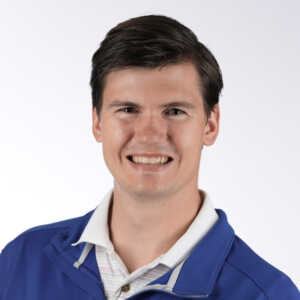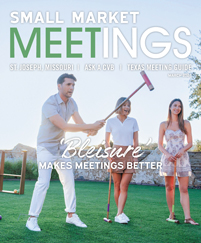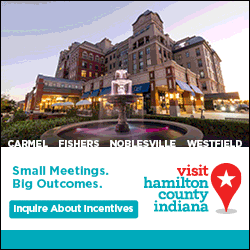Rachel Crick recently spoke with Nathaniel Holic, the membership manager for the Association for Fundraising Professionals, on overcoming imposter syndrome and taking ownership of your career.
Nathaniel Holic attended the University of Mary Washington and graduated in 2020 with a bachelor’s degree in marketing and a minor in physics. He spent time in sales roles before becoming a meetings coordinator at Building Owners and Managers Association (BOMA) International for two years. In March 2025, he was hired as the membership manager at the Association of Fundraising Professionals (AFP) Global. He’s active within PCMA as part of its Next Generation Task Force and was a member of PCMA’s 20 in Their Twenties, Class of 2025.
Q: Can you tell us about any experiences you have had with imposter syndrome?
A: I would say I never really felt imposter syndrome too much until people started asking me to do extra things. I had lots of goals to do things with my career, and I didn’t feel imposter syndrome while I was meeting those goals. But then I was asked to give a talk on leadership, and I’m only 27 years old. I was thinking, “What do I know about leadership?” And I’m talking to people who are leaders in the industry. So that’s where [imposter syndrome] started to kick in. And, like I said, I don’t think I feel it when I’m trying to accomplish those big goals, but when it’s stuff I didn’t try to get, and there’s recognition, it’s like, “Am I the right person for this?” I know other people who feel the same way — that it hits when they’re asked to do extra stuff, like speaking or even being interviewed for an article.
Q: Is there anything about the meetings/events industry that brings out a tendency to feel imposter syndrome?
A: If there is something specific, it might be that a lot of people in this industry kind of fell into this industry. Some people went to college for it, but many people just applied for the job and got the job, and now they’re in the industry. That might be one reason — because people didn’t really see themselves in their roles until it happened. Sometimes, there’s not a clear career path to becoming an event planner, and so they had to go out and make that path for themselves.
Q: When you do feel a bit of imposter syndrome or you’re unsure of yourself, how do you cope?
A: Luckily, I have a pretty good support system, so I’ll talk with my fiancé or my friends and family to bounce ideas off of them. They’re really encouraging because I don’t typically get imposter syndrome, but when I do, they’re like, “You’ve got this. You deserve to be there.” And that’s really encouraging to hear. I also use ChatGPT to bounce ideas off or give myself ideas of things to talk about or how to approach different situations. There’s also support coming from my work. When I was at BOMA, the people I worked with were really supportive and always encouraged me to do stuff like apply for the 20 in Your Twenties program. My VP wrote my recommendation letter. And PCMA has always been very supportive. Everybody who is a member has always helped if I ever need to ask them anything.
Q: Can you tell us how you started taking on leadership roles or extra career goals as a young meeting professional?
A: As far as succeeding in leadership, I would say you have to really take ownership of what you have in front of you. Take ownership of all your responsibilities, and do them to the best of your ability. For anything I’m assigned at work, I try to give 110% and make sure it’s done better than anyone else would do it so they know I’m the best person for the job. And advocating for yourself is super important. It was a little intimidating asking my bosses about applying for PCMA’s 20 in Their Twenties because we had a big conference the same month. But I advocated, gave them reasons why, and they were super, super supportive and pushed me for it. Then also, you can advocate to take on new responsibilities at work as well that I wanted to learn. That’s how I learned, too — getting in there and doing it.
Q: What advantages or challenges do you think the newest generation of meeting and event planners are facing?
A: I’d say, right now, an advantage is AI. It can help you with RFPs, it can help you put stuff together where staff is supposed to be on site, which is nice. I think that you have to be careful, too, because it could eventually take over some jobs, and that could be a disadvantage. Entering the job market post-COVID, in the meetings industry especially, there has been so much change, and we don’t really know what it was like before COVID. There are different things about how meetings are handled in general, and for us to not know is a bit of a disadvantage because you can’t always envision the way things used to be done. But, in a way, that’s an advantage, too, because everything is newer, and there are a lot of new ideas about how you can improve your meetings.













